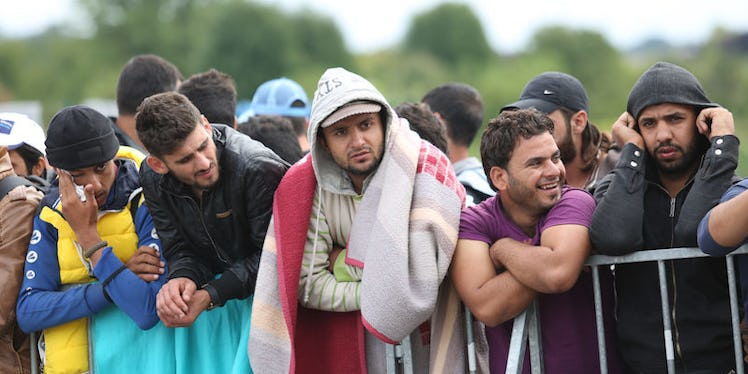
The New American Way: Why The US Is Letting Itself Be Defined By Fear
In the days since the tragic attacks in Paris, the media has turned into a minefield of fear, ignorance and hate.
You can't go on Facebook without encountering a long-winded political rant, and you can't turn on the news without hearing fear-driven rhetoric.
In a somewhat baffling turn of events, the focus has been placed on those seeking refuge from terrorism, rather than the terrorists themselves.
Instead of offering assistance to the innocent people who are fleeing a world of violence, so many in our country have jumped on this bandwagon of shutting doors "just to be safe."
We have all heard the soundbite of Senator Marco Rubio explaining why we "can't" allow Syrian refugees to enter our country.
He explains that even if one out of 1,000 refugees is a terrorist, we "have a problem."
This type of fear based decision making is unfortunately all too familiar to our country. If we stop to explore these unsettling deja-vous, we'll realize we have been here before.
As someone who teaches in a middle school, I feel a personal responsibility to this topic.
In my eighth grade classes, we spend a great deal of time discussing World War II and the Holocaust. One of the things we discuss at length is the notion of bystanders and responsibility.
It is important, when teaching about the Holocaust, to help students develop a clear understanding of why it happened and how it was allowed to happen.
It's easy to talk about Germany's socioeconomic state in the 1930s, and it's easy to talk about the aftermath of World War I.
What's harder to talk about is the blame that can be placed on ordinary citizens, leaders and even our own country.
However, it is essential to understand the Holocaust was not inevitable, and there were hundreds of actions -- and inactions -- that paved the road for the rise of the Nazi party.
In making that distinction, we have to talk about the poor decisions that were made out of fear. In my classes, we do.
We talk about citizens who went along with Nazi regulations simply because it was "the law." We talk about parents who sent their children to Hitler Youth rallies.
And we discuss the US government, which limited the immigration of European refugees during World War Two, making it extremely difficult for citizens to flee Nazi Germany.
The US Holocaust Memorial Museum offers an excellent resource I use every year in my classes.
It prompts students to assess the responsibility of various individuals and groups for what happened in the world between 1933 and 1945.
Each year, after studying the effects of so much fear-based decision making, every single one of my students chooses to rate every single one of these people with the highest number, signifying these people were "very responsible."
Moreover, my students, who are 12 and 13 years old, can understand and articulate the difference between the right choice and the choice made out of uncertainty and worry.
These teenagers can eloquently put into words why we should choose compassion. It astounds me so many adults and leaders cannot.
Part of the reason why educators continue to teach about the Holocaust, why we read Elie Wiesel's novel "Night" and why we spend so much time exploring this dark period in our world's history is so we can learn from past mistakes.
There are so many comparisons one can draw between what is happening right now surrounding this conversation on Syrian refugees and what happened seven decades ago during World War II.
According to Marion Kaplan, a Judaic Studies professor at NYU, "the State Department worried that among Jewish refugees there would be Nazi spies."
Isn't this awfully similar to Senator Rubio's statement earlier this week?
Additionally, on Wednesday, November 29, 1939 -- almost exactly 76 years ago to the day -- a New York Times article was written about Eleanor Roosevelt's stance on the Jewish refugees.
She is quoted as saying:
We must not let ourselves be moved by fear in this country. We have seen that happen too many times in other countries. Sometimes I worry about the possibility that we will follow their example.
This quote, which could have been said today, is concrete proof we have not yet learned from our mistakes.
This conversation will go on forever if we don't have the foresight to see that anxiety-based decision making leads to more death, more violence and more terror.
Instead of giving in to the fear-mongering that plagues our Facebook feeds and news stations, it's time we arm ourselves with truth.
It's time we take action into our own hands and break through the myths surrounding refugees.
It's time we embrace reality, like the fact that since the start of the International Rescue Committee's refugee resettlement program, "no refugee has been arrested on domestic terrorist charges."
It's time to choose compassion, not fear.
If we don't, we'll be in the history books for our poor choices in the future.
They will look back at us, on the wrong side of history again, and they will try to learn from our mistakes.